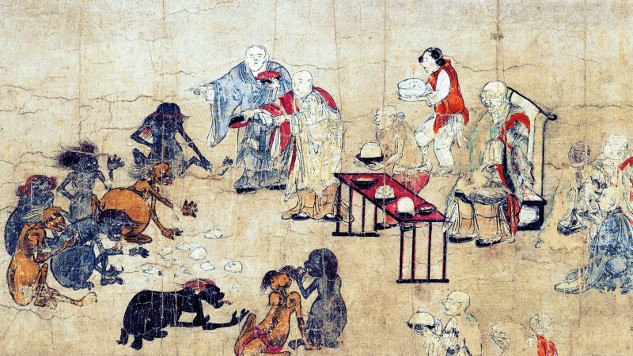
In the teachings of Buddhism, "hungry ghosts" are ethereal entities that exist within the cycle of rebirth, notably as one of the six realms of existence. These beings are often portrayed with minuscule mouths and elongated, slender necks, representing their never-ending desires and yearnings.
Even with their expansive bellies, the narrowness of their necks and the smallness of their mouths prevent them from ever genuinely satiating their hunger, earning them the moniker "hungry ghosts."
This realm of hungry ghosts is marked by profound anguish stemming from their persistent and unmet desires and cravings. Ceaseless desires for sustenance, riches, belongings, and other longings torment entities in this domain. Yet, their pursuit never culminates in fulfillment or peace, resulting in perpetual distress and agony.
On a more symbolic level, the realm of the hungry ghosts mirrors a mindset overwhelmed by unchecked desires and relentless attachments.
This allegorical representation resonates with the human experience, where unchecked desires and attachments often lead to pain and suffering. Buddhist doctrines underscore the significance of nurturing mindfulness, finding contentment, and releasing materialistic attachments to liberate oneself from this relentless cycle of suffering and reincarnation.
The concept of hungry ghosts can be a powerful tool for understanding the nature of desire and suffering. It can also help us cultivate compassion for those suffering in this realm. By reflecting on the suffering of hungry ghosts, we can remind ourselves of the importance of moderation, mindfulness, and detachment. These qualities can help us break free from the cycle of samsara and achieve liberation.
It's important to note that the concept of hungry ghosts is metaphorical and symbolic, not to be taken literally as physical beings. It serves as a tool for understanding the nature of desire, suffering, and the path to liberation in Buddhist philosophy.
The Behavior of Over-Ambitious Individuals
The concept of hungry ghosts and the principles of balance, moderation, and non-attachment can be applied to understand the behavior of individuals, such as oligarchs, who seem driven by insatiable desires and the pursuit of power and wealth. However, it's important to note that applying these concepts to specific individuals or situations may vary and can be complex.
-
Insatiable Desires: People who engage in actions that undermine democracy might be driven by an insatiable desire for more power, control, and wealth. Just as hungry ghosts cannot satisfy their cravings, these individuals might believe that accumulating more resources or power will bring them contentment. However, their pursuit of these desires can become unbalanced, leading to harmful consequences.
-
Lack of Contentment: Like hungry ghosts who cannot find contentment, some people might never feel satisfied with their current level of power or wealth. This can drive them to take increasingly extreme measures to maintain or increase their influence, often at the expense of democratic values and institutions.
-
Impact on Others: The unchecked pursuit of power and wealth can negatively impact society as a whole, similar to how the actions of hungry ghosts affect their realm. people prioritizing their desires over the well-being of the larger community may contribute to inequality, social unrest, and the erosion of democratic principles.
-
Detachment and Responsibility: The concept of non-attachment teaches us to let go of clinging to desires and outcomes. Applying this to people's behavior could involve recognizing the impermanence of power and wealth and understanding that true fulfillment comes from contributing positively to society rather than dominating it. Developing a sense of responsibility for the welfare of others can counteract the harmful effects of unchecked ambition.
-
Balancing Material Pursuits with Ethical Values: The teachings of moderation and balance can encourage individuals, including those in positions of power, to weigh their desires against ethical considerations. Balancing material pursuits with the well-being of society and democratic values can help prevent the destructive consequences of unbridled ambition.
-
Social and Political Engagement: Encouraging a culture of mindfulness and engagement with the broader societal impact of actions can prompt people to reflect on the consequences of their decisions. This can lead to more responsible behavior considering the effects on democracy and the greater good.
It's essential to approach these concepts nuancedly and not generalize the behavior of all wealthy individuals or oligarchs. Various factors influence people's motivations and actions, and their paths are diverse. Applying these principles can help shed light on certain behaviors and offer a framework for fostering a more balanced and ethical approach to power and influence.
Seeking Balance In Our Lives
The concept of seeking balance in one's life to avoid becoming a metaphorical "hungry ghost" draws upon the lessons offered by this Buddhist concept. Here's how it applies:
-
Moderation and Contentment: Just as hungry ghosts are trapped in a cycle of insatiable desires, individuals who constantly chase after material possessions, status, or sensory pleasures can find themselves trapped in a never-ending cycle of seeking without feeling fulfilled. Practicing moderation and cultivating contentment is essential to avoid becoming like hungry ghosts. This means finding a balance between pursuing legitimate needs and desires while recognizing when those desires become excessive and lead to suffering.
-
Mindful Consumption: Due to physical limitations, hungry ghosts cannot satisfy their cravings. Practicing mindful consumption involves being fully aware of what we consume, whether it's food, material goods, or experiences. Mindfulness helps us avoid overindulgence and mindless consumption driven by our desires. By being present at the moment and considering the true impact of our choices, we can prevent ourselves from falling into a cycle of constant craving and dissatisfaction.
-
Detachment and Non-Attachment: The hungry ghost realm represents the suffering caused by attachment and craving. Buddhism teaches the importance of non-attachment, which involves recognizing impermanence and letting go of clinging to things, ideas, and desires. By cultivating detachment, we can break free from the cycle of craving and suffering. This doesn't mean we should avoid enjoying life or pursuing goals, but rather that we should do so with a flexible and open-handed attitude.
-
Cultivating Inner Qualities: Instead of relying solely on external sources to fulfill our happiness, we can cultivate inner qualities such as compassion, gratitude, and mindfulness. These qualities provide a sense of fulfillment that isn't dependent on material possessions or external circumstances. By focusing on personal growth and inner well-being, we can avoid becoming trapped in the constant pursuit of external gratification.
-
Path to Spiritual Growth: The concept of hungry ghosts is a reminder that pursuing material desires alone does not lead to true happiness and contentment. Seeking balance and spiritual growth allows us to transcend the limitations of insatiable cravings and find a deeper sense of purpose and fulfillment.
Avoiding becoming a metaphorical hungry ghost involves cultivating a balanced, mindful, compassionate approach to life. It's about recognizing the potential pitfalls of excessive desires and attachments and making conscious choices that lead to genuine well-being and inner peace.
About the Author
 Robert Jennings is co-publisher of InnerSelf.com with his wife Marie T Russell. He attended the University of Florida, Southern Technical Institute, and the University of Central Florida with studies in real estate, urban development, finance, architectural engineering, and elementary education. He was a member of the US Marine Corps and The US Army having commanded a field artillery battery in Germany. He worked in real estate finance, construction and development for 25 years before starting InnerSelf.com in 1996.
Robert Jennings is co-publisher of InnerSelf.com with his wife Marie T Russell. He attended the University of Florida, Southern Technical Institute, and the University of Central Florida with studies in real estate, urban development, finance, architectural engineering, and elementary education. He was a member of the US Marine Corps and The US Army having commanded a field artillery battery in Germany. He worked in real estate finance, construction and development for 25 years before starting InnerSelf.com in 1996.
InnerSelf is dedicated to sharing information that allows people to make educated and insightful choices in their personal life, for the good of the commons, and for the well-being of the planet. InnerSelf Magazine is in its 30+year of publication in either print (1984-1995) or online as InnerSelf.com. Please support our work.
Creative Commons 4.0
This article is licensed under a Creative Commons Attribution-Share Alike 4.0 License. Attribute the author Robert Jennings, InnerSelf.com. Link back to the article This article originally appeared on InnerSelf.com

Related Books:
Atomic Habits: An Easy & Proven Way to Build Good Habits & Break Bad Ones
by James Clear
Atomic Habits provides practical advice for developing good habits and breaking bad ones, based on scientific research on behavior change.
Click for more info or to order
The Four Tendencies: The Indispensable Personality Profiles That Reveal How to Make Your Life Better (and Other People's Lives Better, Too)
by Gretchen Rubin
The Four Tendencies identifies four personality types and explains how understanding your own tendencies can help you improve your relationships, work habits, and overall happiness.
Click for more info or to order
Think Again: The Power of Knowing What You Don't Know
by Adam Grant
Think Again explores how people can change their minds and attitudes, and offers strategies for improving critical thinking and decision making.
Click for more info or to order
The Body Keeps the Score: Brain, Mind, and Body in the Healing of Trauma
by Bessel van der Kolk
The Body Keeps the Score discusses the connection between trauma and physical health, and offers insights into how trauma can be treated and healed.
Click for more info or to order
The Psychology of Money: Timeless lessons on wealth, greed, and happiness
by Morgan Housel
The Psychology of Money examines the ways in which our attitudes and behaviors around money can shape our financial success and overall well-being.



























